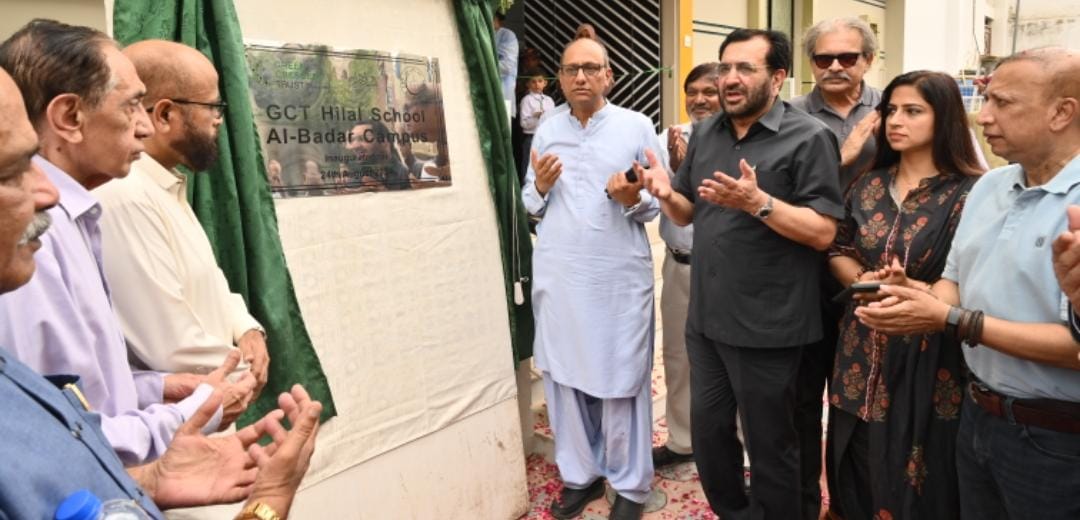Sindh Local Government Minister, Saeed Ghani, has commended the industrialists of Korangi Industrial Area (KIA) for their outstanding philanthropic efforts to ensure quality education for the children of their laborers.
Ghani made these remarks while inaugurating the Al-Badar campus, a new charitable school under the non-profit Green Crescent Trust (GCT), located in the Sharifabad area of KIA. This campus marks GCT’s 170th school, reflecting its 30-year mission to educate underprivileged children in Sindh.
In Sharifabad and nearby Mehran Town, GCT operates 10 schools serving over 2,222 children—60% of whom are girls—with women making up 80% of the teaching staff. The newly opened school, serving 350 students, was constructed in just five months.
The Local Government Minister praised the GCT’s charitable work in the education sector in Sindh continuing for the past three decades without a pause. He appreciated that businessmen associated with numerous industries at KIA had been generously donating to the GCT’s schools in the area to ensure quality schooling for the children mainly of the industrial workers.

Ghani said the outstanding philanthropic assistance by the KIA’s concerned industrialists for the cause of education of children from underserved areas sets a healthy precedent for businessmen in the rest of the country to lend fullest support to noble charitable drives for the school education for deserving communities. He eulogised the Korangi Association of Trade & Industry (KATI) to keep motivated its member industries to fully support philanthropic efforts aimed at benefiting the families of industrial workers. He told the audience that the provincial government valued the services of genuine charities and non-governmental organisations that had been lending full support to the noble campaign to enrol out-of-school children in the province.
The Local Government Minister said that he had firsthand knowledge about the sincere efforts of non-profits like the GCT for the past many years to provide quality school education to children from disadvantaged communities. He appealed to the concerned philanthropists, businessmen, and donors to fully support such genuine charities in the education sector that had been actively partnering with the government to end illiteracy in the country.
KATI President, Syed Johar Ali Qandhari, said the concerned businessmen and industrialists of Korangi industrial estate would continue to extend fullest support to genuine charities like GCT to end the issue of illiteracy in Pakistan in the shortest possible time. He said that supporting charitable drives aimed at the provision of quality education to underprivileged children was one of the best community uplift services by Pakistani businesses.
KATI Deputy Patron-in-chief, Zubair Chhya, greeted GCT for its uninterrupted struggle for the past 30 years to build quality schooling facilities in remote and underserved areas in Sindh. He reaffirmed KATI’s fullest support to efforts by the government and concerned NGOs to enrol out-of-school children.
GCT CEO, Zahid Saeed, praised that a leading donor of his non-profit chose to remain completely anonymous to fund the building of its new school. He said the same anonymous donor through his exceptional philanthropic support ensured the education of 5,000 students enrolled in GCT schools. He expressed gratitude to the committed patrons, donors, and supporters of the GCT’s educational drive that had been massively benefiting a total of over 32,199 students enrolled in the schools of his non-profit. He said the services of GCT were always available to the concerned government authorities, NGOs, and other non-profits in the education sector, which strive to achieve the aim of enrolling out-of-school children in the country.
He said that given the extraordinary support, the GCT received from the KIA’s industrialists in particular and the business community in general, his non-profit was well on track to achieve its Vision-2025 which stands for increasing its charitable schools in Sindh to over 250 having a total enrolment of 100,000 out-of-school children by end of 2025.


